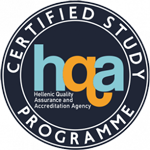Theory / Lab / Tutoring / Exercises Sessions
6 / - / - / -
Instruction & Examination Language
Greek
Available for Erasmus Students
Yes
Course Category
Compulsory
Course Type
Background Knowledge
Faculty
N. Belesis, G. Papanastasopoulos
Course Objectives - Contents
I. Auditing and Internal Control
The course covers the following topics:
- Introduction to the basic concepts of auditing and the auditing environment
- International and Greek auditing standards
- Development of internal control systems and processes
- Development of external control systems and processes
- Fraud control (financial crime)
- Issues relating to creative accounting
- Financial statement fraud
- Practical applications of the above topics
II. Financial Statement Analysis
- Scope of financial statement analysis
- Fundamental issues in accounting and auditing
- Types, methods and problems of the methods of financial statement analysis
- Liquidity and activity analysis
- Profitability and activity analysis
- Analysis of capital structure
- Investment analysis
Learning Results
I. Auditing and Internal Control
This course provides a thorough analysis of the internal and external control processes of corporate financial statements. The course builds on the knowledge gained from Financial and Managerial Accounting and Cost Accounting, covering all the areas that require analysis and control so that the financial statements and, more importantly, the financial results of companies can be calculated correctly and in accordance with existing regulations.
On successful completion of the course students will be able to:
- record Greek and international developments in auditing procedures and the actions of auditing bodies;
- describe the techniques and methods used by chartered accountants in external control;
- organize internal control services; and
- adopt controls to counter financial fraud and financial crime.
II. Financial Statement Analysis
This module reflects the importance of the use and analysis of financial statements. Expected learning outcomes for students are:
- to understand the basic motives and interests for financial statement analysis;
- to acquire in-depth knowledge of fundamental accounting problems;
- to develop detailed knowledge of the types, methods, and problems of financial statement analysis;
- to conduct liquidity, activity, profitability, and capital structure analysis;
- to prepare pro forma financial statements;
- to use default risk models based on accounting figures;
- to conduct investment analysis based on fundamental per share ratios and fundamental to price ratios; and to make operating, investment, and financing decisions.




